Filter by
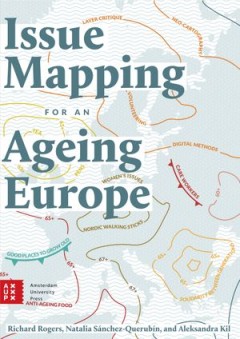
Issue Mapping for an Ageing Europe
Issue Mapping for an Ageing Europe is a seminal guide to mapping social and political issues with digital methods. The issue at stake concerns the imminent crisis of an ageing Europe and its impact on the contemporary welfare state. The book brings together three leading approaches to issue mapping: Bruno Latour's social cartography, Ulrich Beck's risk cartography and Jeremy Crampton's critical…
- Edition
- -
- ISBN/ISSN
- 9789048524457
- Collation
- -
- Series Title
- -
- Call Number
- 300 ROG i

Irregular Migrants in Belgium and the Netherlands: Aspirations and Incorporation
In Irregular Migrants in Belgium and the Netherlands, Masja van Meeteren studies the different ways in which irregular migrants live in Belgium and the Netherlands. The book offers an empirically grounded theoretical critique of the dominant research practice that focuses on 'survival strategies', relies on comparisons of migrant communities and overemphasizes structural explanations. Instead, …
- Edition
- -
- ISBN/ISSN
- 9789048523085
- Collation
- -
- Series Title
- -
- Call Number
- 300 MEE i
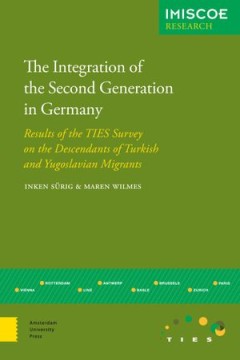
The integration of The Second Generation in Germany: Results of The Ties Surv…
This report on the German results of the Integration of the Second Generation in Europe (TIES) survey looks at the integration process for secondgeneration inhabitants of Turkish and Yugoslavian backgrounds living in Berlin and Frankfurt. Examining the TIES results, Inken Sürig and Maren Wilmes discuss diverse topics such as educational outcomes, segregation and housing, ethnic and cultural or…
- Edition
- -
- ISBN/ISSN
- 9789089648426
- Collation
- -
- Series Title
- -
- Call Number
- 351.81 WIL i
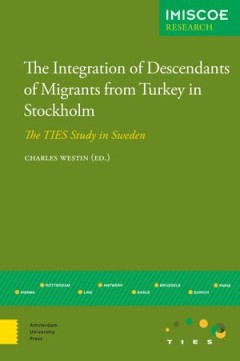
The Integration of Descendants of Migrants from Turkey in Stockholm: The TIES…
This timely book, which is based on the results of the Integration of the Second Generation in Europe survey, presents the disturbing results of a recent study in Stockholm that examines the experiences of residents descended from Turkish migrants. Focusing on three different ethnonational groups “Turks, Kurds, and Syriacs" the contributors explore issues such as identity, family situation,…
- Edition
- -
- ISBN/ISSN
- 9789048526956
- Collation
- -
- Series Title
- -
- Call Number
- 300 WES i
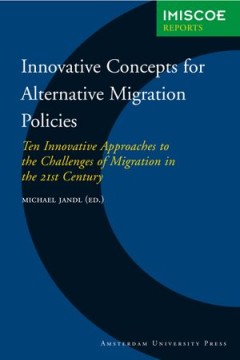
Innovative Concepts for Alternative Migration Policies
Based on the strengths of combined ideas from migration researchers, policy experts, and representatives of international organisations, this timely volume provides eight basic principles for the design of innovative migration policy. Presents new proposals for innovative migration policies.
- Edition
- -
- ISBN/ISSN
- 9789053569900
- Collation
- -
- Series Title
- -
- Call Number
- 320 INN i

The Impact of Losing Your Job: Unemployment and Influences from Market, Famil…
Losing a job has always been understood as one of the most important causes of downward social mobility in modern societies. And it's only gotten worse in recent years, as the weakening position of workers has made re-entering the labour market even tougher. The Impact of Losing Your Job builds on findings from life course sociology to show clearly just what effects job loss has on income, fami…
- Edition
- -
- ISBN/ISSN
- 9789048526352
- Collation
- -
- Series Title
- -
- Call Number
- 300 EHL i

Immigration and Social Systems
Popular science
- Edition
- -
- ISBN/ISSN
- 9789089644534
- Collation
- -
- Series Title
- -
- Call Number
- 351.81 DAM i
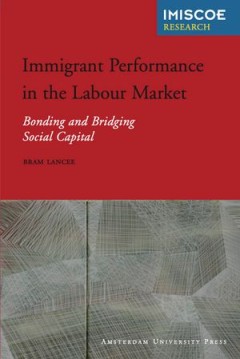
Immigrant Performance in the Labour Market: Bonding and Bridging Social Capital
To what extent can different forms of social capital help immigrants make headway on the labour market? An answer to this pressing question begins here. Taking the Netherlands and Germany as case studies, the book identifies two forms of social capital that may work to increase employment, income and occupational status and, conversely, decrease unemployment. New insights into the concepts of b…
- Edition
- -
- ISBN/ISSN
- 9789089643575
- Collation
- -
- Series Title
- -
- Call Number
- 351.81 LAN i
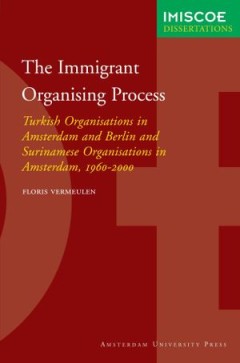
The Immigrant Organising Process: Turkish Organisations in Amsterdam and Berl…
This study focuses on the emergence and persistence of immigrant organisations in host societies. The relevance of immigrant organisations for both the host society and the immigrants themselves has been effectively demonstrated in many different studies. However, the question why immigrant organisations emerge and why they often persist over a long period is not adequately answered. In this st…
- Edition
- -
- ISBN/ISSN
- 9789053568750
- Collation
- -
- Series Title
- -
- Call Number
- 351.81 VER i

Immigrant Associations, Integration and Identity: Angolan, Brazilian and East…
This book sheds light on the integration processes and identity patterns of Angolan, Brazilian and Eastern European communities in Portugal. It examines the privileged position that immigrant organisations hold as interlocutors between the communities they represent and various social service mechanisms operating at national and local levels. Through the collection of ethnographic data and the …
- Edition
- -
- ISBN/ISSN
- 9789089640369
- Collation
- -
- Series Title
- -
- Call Number
- 351.81 SAR i
 Computer Science, Information & General Works
Computer Science, Information & General Works  Philosophy & Psychology
Philosophy & Psychology  Religion
Religion  Social Sciences
Social Sciences  Language
Language  Pure Science
Pure Science  Applied Sciences
Applied Sciences  Art & Recreation
Art & Recreation  Literature
Literature  History & Geography
History & Geography